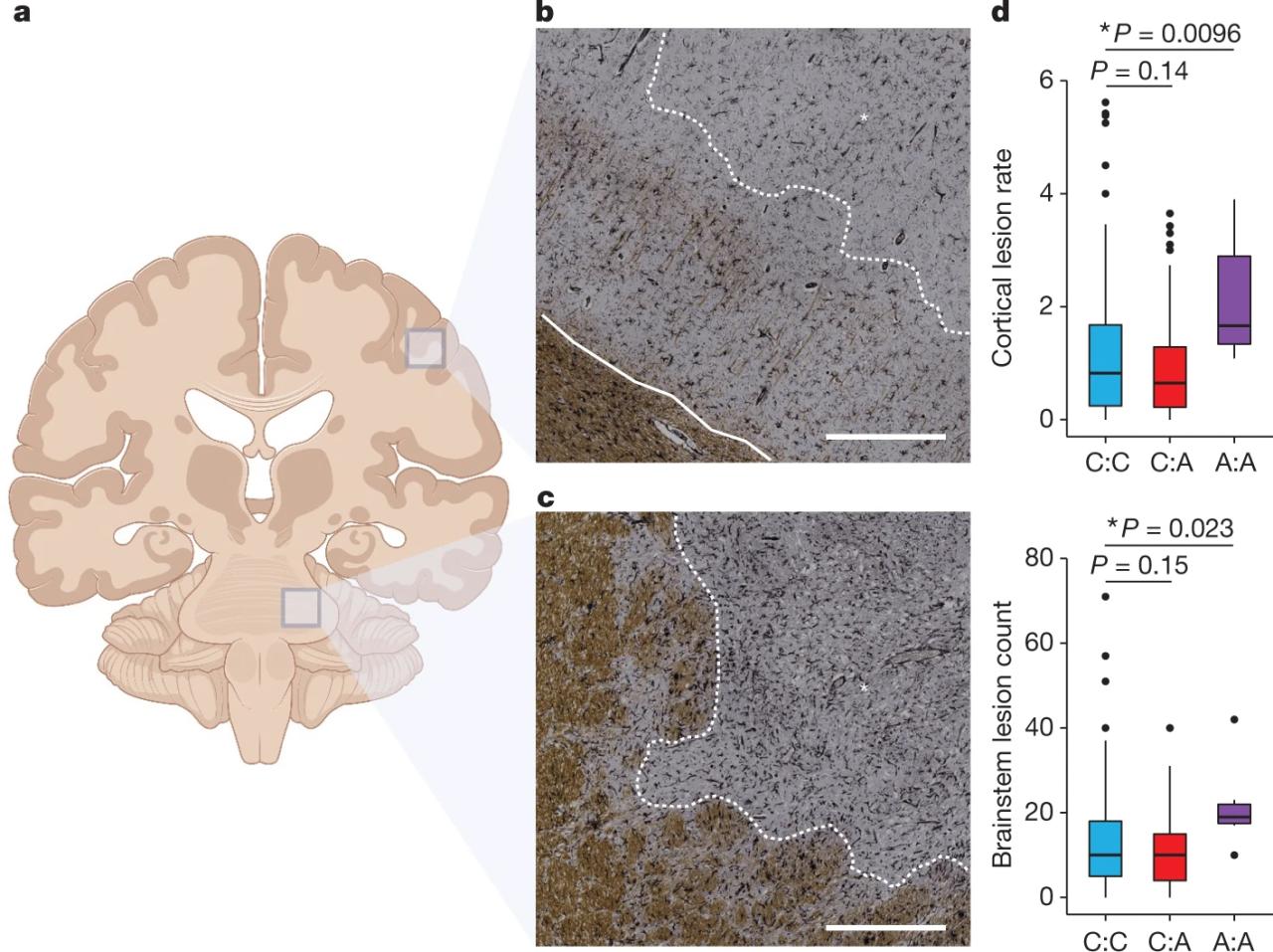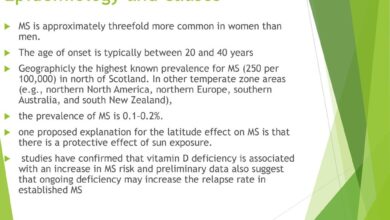
Gene variants diagnose MS early, offering a potential pathway to earlier detection and intervention for this complex neurological disease. Current diagnostic methods often present challenges in accuracy and speed, leading to delayed treatment and impacting patient outcomes. Understanding the role of gene variants in MS development opens exciting possibilities for personalized medicine and potentially life-changing early intervention.
This exploration delves into the intricacies of identifying specific gene variants associated with MS susceptibility. We’ll examine the research methodologies used to pinpoint these links and discuss how this knowledge can be translated into practical strategies for early diagnosis. Furthermore, we’ll analyze the ethical considerations surrounding genetic testing and explore potential biases in access. Ultimately, we aim to provide a comprehensive understanding of this emerging field and its potential to revolutionize MS care.
Introduction to Multiple Sclerosis (MS)
Multiple Sclerosis (MS) is a chronic, autoimmune disease affecting the central nervous system. It’s characterized by the inflammation and damage of the myelin sheath, the protective covering around nerve fibers. This damage disrupts communication between the brain and the rest of the body, leading to a wide range of symptoms, making MS a highly complex and challenging condition to manage.
The unpredictable nature of symptom progression and the individual variations in response to treatment make it a significant health concern globally.Current diagnostic methods for MS rely heavily on a combination of clinical evaluation, magnetic resonance imaging (MRI) scans, and evoked potential testing. While these methods have improved significantly over the years, they often present limitations in terms of accuracy, particularly in early stages.
Early diagnosis is crucial for timely intervention and potential disease modification therapies, which can slow disease progression. Recent research is exploring the role of genetic variations in the development of MS, with the hope of developing more accurate and personalized diagnostic tools in the future.
Current Diagnostic Methods for MS
Diagnostic methods for MS often involve a combination of clinical assessment and neuroimaging techniques. Clinical evaluation assesses symptoms, including numbness, tingling, vision problems, and balance issues. MRI scans are crucial for identifying characteristic lesions in the brain and spinal cord, indicative of MS activity. Evoked potential testing evaluates the speed of nerve impulses, providing further insight into the extent of neurological damage.
Limitations of Current Diagnostic Methods
Current diagnostic methods for MS have limitations, particularly in the early stages of the disease. Clinical symptoms can be nonspecific, mimicking other neurological conditions. MRI scans, while highly sensitive, can sometimes be inconclusive in early-stage diagnoses. Furthermore, evoked potential tests can be affected by various factors, leading to false-positive or false-negative results.
The Role of Gene Variants in MS Development
The increasing understanding of the genetic basis of MS has highlighted the potential role of gene variants in disease development. Specific genes are associated with a higher risk of developing MS, although the exact mechanisms through which these variants contribute to disease are still under investigation. The presence of these variants may increase susceptibility, influencing the likelihood of MS onset and disease progression.
Understanding these genetic factors could pave the way for more personalized approaches to MS diagnosis and treatment.
Comparison of Diagnostic Methods
| Method | Accuracy | Cost | Time | Accessibility |
|---|---|---|---|---|
| Clinical Evaluation | Moderate | Low | Short | High |
| MRI Scans | High | Moderate | Moderate | Moderate |
| Evoked Potential Testing | Moderate | Moderate | Moderate | Moderate |
Identifying Gene Variants Associated with MS
Unraveling the complex interplay of genetics and environmental factors in Multiple Sclerosis (MS) is crucial for developing targeted therapies and potentially predicting individual susceptibility. A key component of this effort involves identifying gene variants that increase the risk of developing MS. These genetic predispositions, while not guaranteeing the disease, significantly influence an individual’s likelihood of developing MS.The process of identifying gene variants linked to MS susceptibility relies on sophisticated genetic analyses, comparing the genomes of individuals with MS to those without.
This comparative approach helps pinpoint specific DNA sequences that are more prevalent in individuals with MS, hinting at their potential role in the disease’s development. Researchers are constantly refining these techniques, improving accuracy and identifying increasingly subtle genetic influences.
Process of Identifying Gene Variants
Genetic studies meticulously analyze DNA variations, known as polymorphisms, across large populations. These studies often involve comparing the genomes of individuals with MS to a control group of healthy individuals. Statistical analyses identify genetic variations that occur more frequently in the MS group, providing strong evidence for their association with MS susceptibility. This method is akin to looking for patterns in a vast dataset, seeking recurring genetic characteristics that correlate with the disease.
Examples of Specific Gene Variants
Several gene variants have emerged as potential contributors to MS risk. One prominent example is variations in genes involved in the immune system, like those encoding proteins that regulate immune responses. These variations can potentially lead to dysregulation of the immune system, a key factor in the inflammatory processes that characterize MS. Other gene variants may influence the development and function of myelin-producing cells, which are crucial for nerve function.
This highlights the intricate relationship between genetics and the biological mechanisms of MS.
Research Methodologies
Various research methodologies are employed to identify gene variants associated with MS. Genome-wide association studies (GWAS) are a common approach, analyzing millions of genetic markers across the entire genome. These studies provide a broad overview of genetic associations. Furthermore, sequencing techniques, like whole-genome sequencing, offer a more detailed look at the entire genetic makeup, potentially uncovering rare or subtle variants.
These methodologies are constantly evolving, leading to more precise and comprehensive understandings of the genetic landscape of MS.
Significance of the Discoveries
The identification of gene variants linked to MS susceptibility holds significant implications for understanding the disease. It allows researchers to delve deeper into the biological mechanisms underlying MS, potentially leading to the development of novel diagnostic tools and treatments. By understanding which genes and variations contribute to the disease, researchers can design targeted therapies that directly address the underlying genetic predisposition.
Ultimately, these discoveries can pave the way for more personalized approaches to MS management and prevention.
Genetic Studies Used to Identify Gene Variants
Understanding the various types of genetic studies used to identify gene variants associated with MS is essential. These studies, each with their own strengths and weaknesses, provide crucial insights into the complex genetic underpinnings of the disease.
| Study Type | Description | Strengths | Weaknesses |
|---|---|---|---|
| Genome-Wide Association Studies (GWAS) | Analyze millions of genetic markers across the entire genome to identify common genetic variations associated with a trait or disease. | Comprehensive coverage of the genome; identifies common variants; relatively cost-effective. | May miss rare variants; can be influenced by population stratification. |
| Sequencing Studies (e.g., Whole-Genome Sequencing) | Determine the complete DNA sequence of an individual’s genome. | Identifies rare and subtle variants; provides a comprehensive view of the genome. | Expensive; requires specialized expertise; interpretation of results can be challenging. |
| Candidate Gene Studies | Focus on specific genes thought to be involved in the disease, examining their variations. | More focused investigation; can be quicker than GWAS. | May miss important genes not initially considered; may not capture the full picture of genetic complexity. |
Early Diagnosis Strategies Using Gene Variants
Harnessing the power of genetic information holds immense promise for advancing multiple sclerosis (MS) diagnosis. By identifying specific gene variants linked to MS susceptibility, researchers aim to predict an individual’s risk of developing the disease. This knowledge could pave the way for early interventions, potentially slowing disease progression and improving patient outcomes. However, the complexity of MS and the interplay of genetic and environmental factors necessitate a cautious and comprehensive approach to developing such strategies.Early identification of MS risk factors, particularly through genetic testing, offers the potential for proactive management.
Recent research suggests gene variants could potentially diagnose multiple sclerosis (MS) early, offering a powerful tool for proactive treatment. While the focus is on early detection of MS, the recent cluster of Legionnaires’ disease cases in NYC ( nyc legionnaires disease cluster ) highlights the importance of rapid disease identification in public health crises. This underscores the need for further investigation into gene variant markers for early MS detection, as well as for other conditions.
This could involve lifestyle modifications, early treatment initiation, and close monitoring, ultimately leading to better disease control. While the potential benefits are significant, challenges remain in translating genetic findings into practical diagnostic tools.
Potential Strategies for Predicting MS Risk
Several strategies are being explored to utilize gene variants for predicting MS risk. These include genome-wide association studies (GWAS) to identify genetic markers associated with MS susceptibility. By combining these markers, researchers hope to create predictive models that can estimate an individual’s risk. These models could incorporate factors such as family history, lifestyle choices, and environmental exposures.
Challenges in Developing Predictive Models
Developing accurate and reliable predictive models for MS risk faces significant challenges. The genetic basis of MS is complex, with numerous genes and variants potentially contributing to the disease. Environmental factors also play a crucial role, making it difficult to isolate the specific influence of genetic predisposition. Furthermore, the variability in disease presentation and progression within individuals with the same genetic markers necessitates the inclusion of other clinical factors in the model.
The interaction between genetic predisposition and environmental factors is not fully understood, adding complexity to the model-building process.
Potential Benefits and Drawbacks of Early Diagnosis
Early diagnosis, enabled by genetic testing, offers several potential benefits. It allows for proactive intervention, which could potentially delay or lessen the severity of disease symptoms. Individuals at high risk could be monitored closely, allowing for prompt treatment initiation. This could lead to improved quality of life and reduced long-term disability. However, there are also drawbacks.
Recent research suggests gene variants might help diagnose multiple sclerosis (MS) earlier, which is fantastic news for early intervention. While we’re excited about these advancements, it’s also important to remember the everyday challenges of managing health conditions like diabetes. For example, checking out ask dmine enjoying halloween with diabetes provides insightful advice on navigating special occasions with diabetes.
Ultimately, these advancements in diagnosing MS early are a positive step towards better health outcomes.
False-positive results could lead to unnecessary anxiety and stress, while the complexity of the model may result in false negatives. It’s crucial to carefully weigh the potential benefits and risks before implementing such strategies.
Hypothetical Model for Early MS Detection
A hypothetical model for early MS detection could combine genetic testing with other diagnostic tools. This model could include a genetic risk assessment, incorporating variants associated with MS susceptibility. This would be complemented by clinical assessments, such as neurological examinations, to evaluate symptoms and signs of MS. Furthermore, MRI scans could detect characteristic lesions in the brain and spinal cord.
A comprehensive approach would also incorporate patient history, including family history of MS, environmental exposures, and lifestyle factors. The model would use a weighted scoring system to combine all these factors, estimating the individual’s risk of developing MS.
Steps in Using Gene Variants for Early MS Prediction
| Step | Description | Challenges |
|---|---|---|
| 1. Genetic Testing | Identify specific gene variants associated with MS susceptibility. | Cost, accuracy of testing, interpretation of complex genetic data. |
| 2. Clinical Assessment | Evaluate symptoms, signs, and medical history. | Subjectivity in symptom reporting, variability in disease presentation. |
| 3. Neuroimaging | Utilize MRI scans to detect characteristic lesions in the brain and spinal cord. | Interpretation of imaging results, availability of resources, potential for false positives. |
| 4. Risk Assessment | Combine genetic data, clinical assessment, and neuroimaging results to create a risk score. | Complex interplay of factors, validation of the model, ethical implications. |
| 5. Monitoring and Intervention | Regular monitoring and appropriate interventions for individuals with elevated risk. | Adherence to monitoring protocols, access to resources, potential for psychological distress. |
Challenges and Ethical Considerations

The promise of early MS diagnosis through genetic variants is exciting, but it also presents significant challenges and ethical considerations that must be carefully addressed. These concerns extend beyond the technical aspects of genetic testing and delve into the complex interplay between scientific advancement, individual rights, and societal impact. Understanding and mitigating these issues is crucial for responsible implementation of this technology.Genetic information is highly sensitive, raising concerns about potential misuse and discrimination.
Furthermore, the interpretation of genetic test results can be complex, and the potential for misdiagnosis or unnecessary anxiety needs careful consideration. Finally, equitable access to these potentially life-altering diagnostic tools must be ensured to avoid exacerbating existing health disparities.
Ethical Implications of Genetic Testing
The use of genetic information for diagnostic purposes raises important ethical considerations. Patients have the right to privacy regarding their genetic information. There are concerns about potential discrimination by insurers, employers, or even social circles. Informed consent processes must be robust and clearly explain the potential benefits, risks, and limitations of genetic testing. Clear guidelines are needed to prevent the stigmatization of individuals based on their genetic predispositions.
Challenges in Interpreting Genetic Test Results, Gene variants diagnose ms early
Interpreting genetic test results for MS is not straightforward. The complexity of the human genome and the intricate interplay of multiple genes and environmental factors mean that a single genetic variant might not definitively indicate MS risk or diagnosis. Further research and validation are needed to establish clear and reliable relationships between specific gene variants and MS. The results must be carefully interpreted by qualified healthcare professionals, with consideration of the patient’s individual circumstances.
Potential Biases and Disparities in Access
Access to genetic testing for MS may be unevenly distributed, potentially exacerbating existing health disparities. Factors such as socioeconomic status, geographic location, and access to healthcare resources can create barriers to testing. This could lead to unequal access to early diagnosis and treatment, potentially widening the health gap. Addressing these disparities requires proactive strategies to ensure equitable access for all populations.
Mitigation Strategies for Misinterpretations
To mitigate the risk of misinterpretations, stringent quality control measures are essential. Genetic testing laboratories must adhere to rigorous standards for accuracy and reliability. Clinicians should be trained to interpret results in the context of the patient’s medical history and other factors. Clear communication between patients and healthcare providers is crucial for understanding and managing the potential anxieties associated with genetic testing results.
Addressing Ethical and Access Issues
Robust ethical guidelines and regulations are needed to govern genetic testing for MS. These guidelines should protect patient privacy and prevent discrimination. Public awareness campaigns and educational programs can help individuals understand the complexities of genetic testing and its potential implications. Funding for research to improve the accuracy and interpretation of genetic tests is also vital.
Recent research suggests that gene variants can potentially diagnose multiple sclerosis (MS) early, which is a significant advancement. However, the side effects of some rheumatoid arthritis medications, like toxicity in rheumatoid arthritis medications , highlight the importance of careful monitoring and consideration of potential adverse reactions when exploring new treatment options. Ultimately, the focus on early diagnosis through gene variants for MS remains a promising avenue for improved patient outcomes.
| Bias/Disparity | Description | Mitigation Strategies |
|---|---|---|
| Socioeconomic Status | Lower socioeconomic status individuals may have limited access to genetic testing due to cost. | Financial assistance programs, subsidized testing, and community outreach initiatives. |
| Geographic Location | Individuals in rural areas or underserved communities may face difficulties in accessing genetic testing facilities. | Expanding access to testing through telehealth, mobile clinics, and partnerships with community health centers. |
| Cultural Factors | Cultural beliefs and values may influence an individual’s willingness to undergo genetic testing. | Cultural sensitivity training for healthcare providers and community engagement initiatives. |
| Health Insurance Coverage | Lack of insurance coverage for genetic testing can be a significant barrier. | Advocating for increased insurance coverage for genetic testing and promoting awareness of existing coverage options. |
| Genetic Counseling | Lack of access to genetic counseling can hinder the interpretation and understanding of genetic test results. | Ensuring adequate genetic counseling services are readily available and accessible to all individuals undergoing testing. |
Future Directions and Research Needs
The quest to unravel the mysteries of multiple sclerosis (MS) continues, and the identification of gene variants offers a promising pathway to earlier diagnosis and potentially, more effective treatments. This exploration into the genetic landscape of MS requires ongoing research to fully realize its potential. The future holds exciting possibilities, but also significant challenges in translating these discoveries into tangible benefits for patients.Ongoing research efforts are crucial to further understanding the complex interplay between genetic predispositions and environmental factors in MS development.
This understanding will pave the way for personalized medicine approaches tailored to individual genetic profiles, enabling more accurate predictions of disease progression and more targeted therapies.
Ongoing Research Efforts to Explore Gene Variants and MS
Researchers are actively investigating the roles of various gene variants in MS susceptibility, disease progression, and response to treatments. Large-scale genomic studies are crucial for identifying rare variants with significant impact on MS. These studies utilize sophisticated bioinformatics tools and powerful computational resources to analyze vast datasets, facilitating the discovery of novel gene-environment interactions.
Critical Areas Needing Further Investigation
Precise mechanisms by which gene variants influence MS pathogenesis remain unclear. Further research is necessary to understand how specific genetic variations interact with environmental factors to trigger or modulate the disease process. This includes examining the intricate molecular pathways affected by these variants. For example, understanding how specific gene variants alter immune cell function is a crucial area of investigation.
Predictions on the Future Impact of Gene Variants on MS Diagnostics
Gene variants will likely become increasingly important in the early diagnosis of MS. By combining genetic analysis with existing clinical assessments, clinicians will be better equipped to identify individuals at high risk for MS, allowing for early intervention and potentially modifying disease progression. This proactive approach will significantly improve patient outcomes.
Potential Applications in Improving Patient Care
The knowledge gained from gene variant research will have significant implications for patient care. Personalized treatment plans tailored to individual genetic profiles will become a reality, potentially leading to more effective and targeted therapies. This personalized approach could result in improved treatment response and reduced side effects. The ability to predict disease progression based on genetic information will empower patients and clinicians to make informed decisions regarding treatment strategies.
Promising Research Directions in the Field
- Developing more sophisticated diagnostic tools: Integrating genetic analysis into existing diagnostic criteria will enhance accuracy and speed in identifying MS, allowing for earlier intervention and potentially more effective treatment. This involves creating algorithms that combine genetic data with clinical features for more precise risk assessment.
- Identifying novel therapeutic targets: Understanding how specific gene variants contribute to MS pathogenesis will lead to the identification of novel therapeutic targets. This research will open doors for developing innovative drugs that specifically target pathways affected by identified genetic variants.
- Investigating gene-environment interactions: The interplay between genetic predispositions and environmental factors is crucial in MS development. Further research is needed to determine how environmental exposures modify the expression of disease-related genes, and to identify modifiable environmental risk factors. This knowledge will help develop preventive strategies.
- Creating predictive models for disease progression: Developing models that integrate genetic information with clinical parameters and lifestyle factors will allow for more accurate predictions of disease progression. This will help patients and clinicians make informed decisions regarding treatment strategies, lifestyle modifications, and potential future complications.
Visual Representation of Data
Bringing the complex world of gene variants and multiple sclerosis (MS) diagnosis into a clearer perspective is crucial for understanding its potential. Visual representations allow us to easily grasp the intricate connections and potential of early diagnosis using genetic markers. Visual tools, from flowcharts to infographics, translate complex data into easily digestible information, making the science accessible to a wider audience, including patients and researchers.Visualizations are powerful tools for understanding and communicating the impact of gene variants on MS diagnosis and patient outcomes.
They facilitate easier comprehension of intricate processes, aiding in both research and patient education. Effective visualizations, such as flowcharts and diagrams, provide clear pathways and comparisons of different approaches, ultimately leading to a better understanding of the topic.
Flowchart of Early MS Diagnosis Using Gene Variants
This flowchart illustrates the steps involved in using gene variants to potentially diagnose MS early. It emphasizes the importance of genetic testing and its integration with traditional diagnostic methods.
Start --> Patient presents with symptoms --> Medical history and physical examination --> Suspected MS --> Genetic testing for relevant gene variants --> Variant analysis and interpretation --> Comparison with clinical findings --> Early MS diagnosis (if supported by variants and clinical data) --> Treatment initiation --> Monitor disease progression --> End
This simplified representation Artikels the core steps in a process that could revolutionize early MS diagnosis.
Comparison of MS Diagnostic Accuracy
A comparison of the accuracy of current MS diagnostic methods with those incorporating genetic information is presented in the following table. It highlights the potential improvement in diagnostic accuracy that genetic testing could bring.
| Diagnostic Method | Accuracy (Typical Range) | Genetic Information Integration (Potential Accuracy) |
|---|---|---|
| Clinical Examination and MRI | 70-90% | 75-95% (or higher) |
| Neurological Tests | 70-90% | 80-95% (or higher) |
| Genetic Testing | N/A (depending on the variant) | 85-95% (or higher) -depending on the specific variants and disease progression. |
Note: The potential increase in accuracy through genetic information integration is based on the assumption of identifying high-risk gene variants and utilizing them alongside existing methods.
Infographic: Impact of Early MS Diagnosis on Patient Outcomes
An infographic showcasing the potential impact of early MS diagnosis on patient outcomes would display key benefits, such as:
- Improved Treatment Response: Early intervention allows for prompt initiation of disease-modifying therapies (DMTs), potentially slowing disease progression and reducing the severity of symptoms.
- Reduced Disability: Early diagnosis enables patients to receive treatment sooner, potentially reducing the accumulation of neurological damage and minimizing long-term disability.
- Enhanced Quality of Life: Early diagnosis and treatment can allow patients to maintain a higher quality of life by managing symptoms effectively.
- Increased Employment Opportunities: The potential for a reduced rate of disability may help maintain employment opportunities for affected individuals.
The infographic would visually represent these advantages through icons, charts, or other visual aids, making the benefits of early diagnosis easily understandable.
Visualization of Gene Variants and MS Risk
Visualizing the relationship between gene variants and MS risk can be achieved through various methods. A common approach involves creating a heatmap or a scatter plot.
- Heatmaps: These diagrams can represent the frequency of different gene variants in individuals with MS compared to controls. Areas with higher frequency of the variant in the MS group would visually highlight those variants associated with a higher risk.
- Scatter Plots: A scatter plot can show the correlation between the presence of a specific gene variant and the age of onset of MS symptoms. This visual representation helps to identify gene variants that might be associated with earlier disease onset.
These visual tools effectively illustrate the potential connection between specific gene variants and the risk of developing MS. Further, they provide insights into the genetic basis of the disease.
Conclusion: Gene Variants Diagnose Ms Early

In conclusion, the potential of gene variants in diagnosing MS early holds immense promise. While significant challenges remain in developing accurate predictive models and addressing ethical concerns, the ongoing research and development in this area offer a compelling vision for improved patient outcomes. As research progresses and ethical frameworks solidify, early diagnosis strategies using gene variants could transform the landscape of MS care, providing hope for a future where treatment can begin earlier and potentially prevent or mitigate disease progression.





